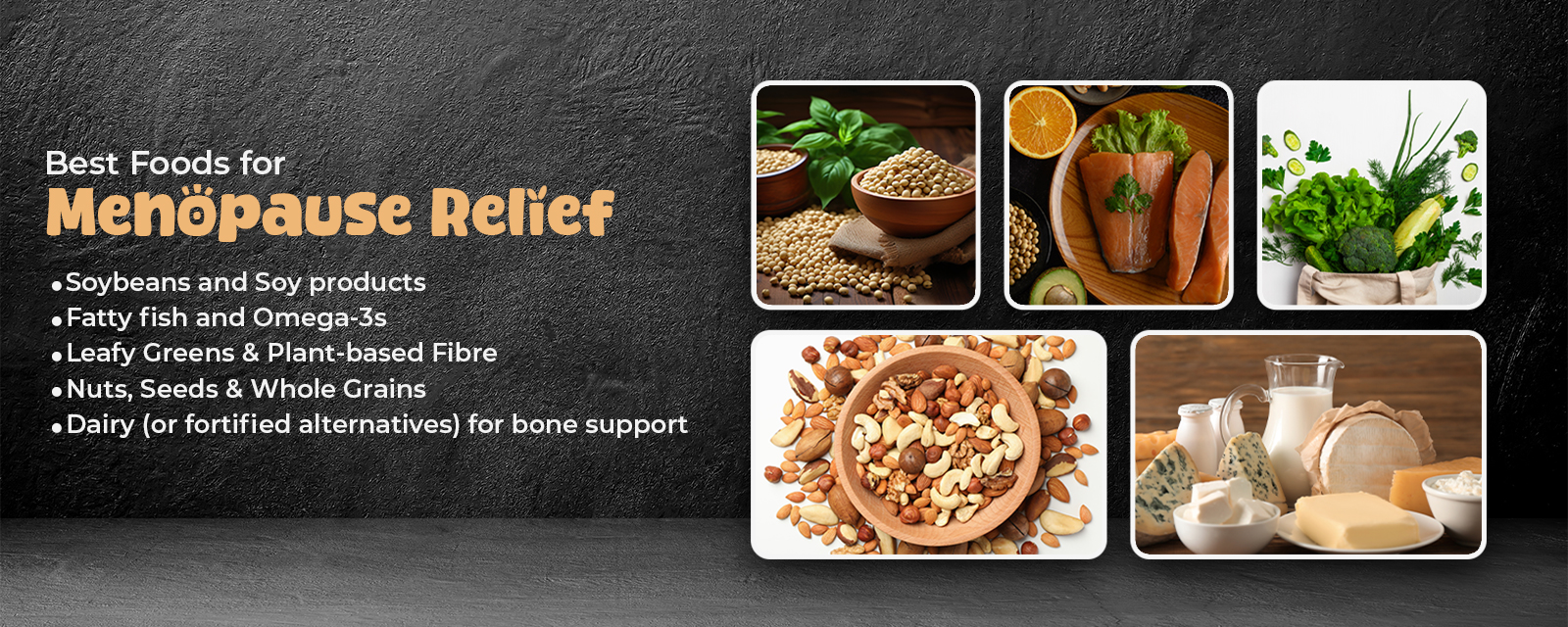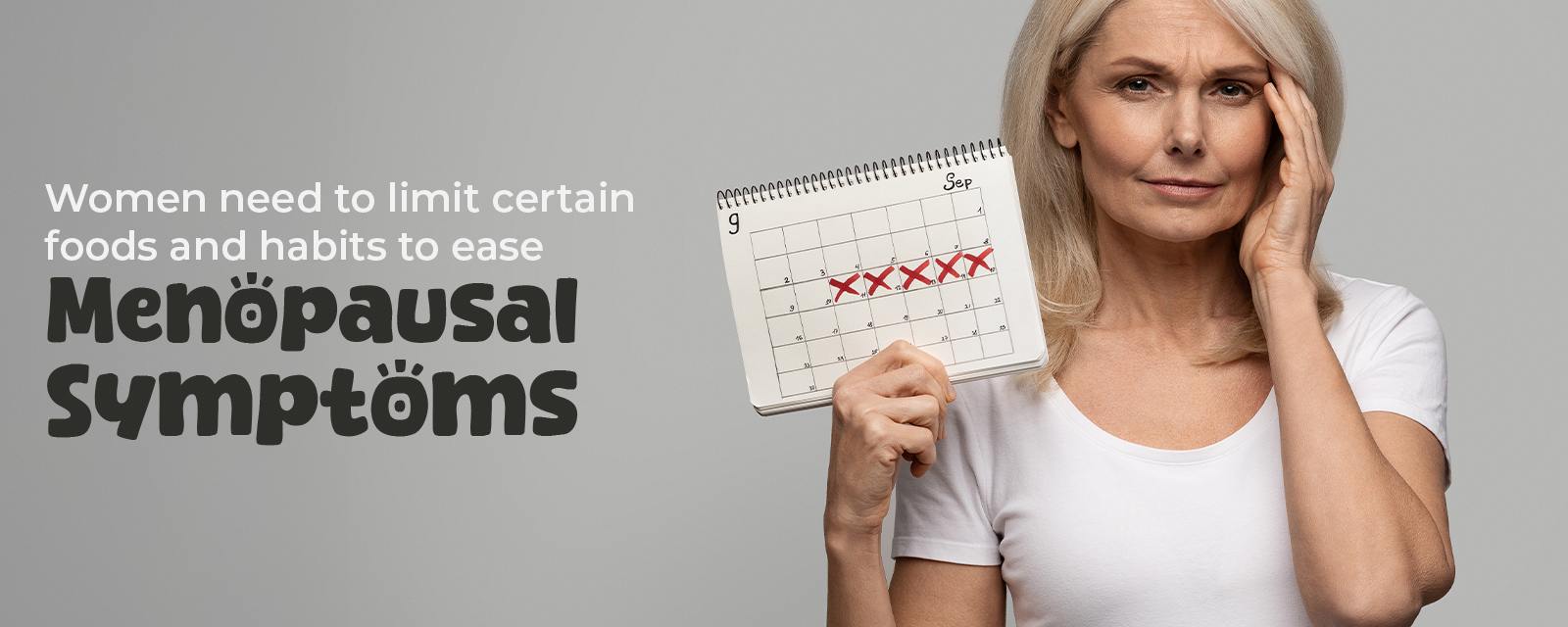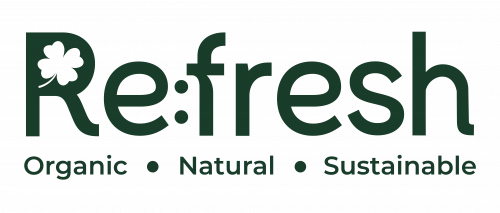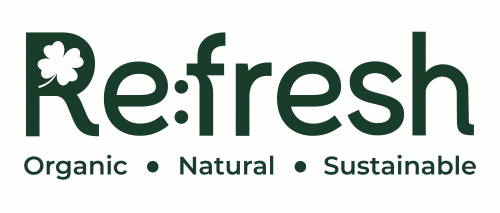Women experience a range of biological changes in their lifetime, every phase carrying a signifying a distinct change.
Between the ages of 50 to 55, women usually experience menopause symptoms, where hormone levels naturally decline as their reproductive years end.
Menopause can have painful symptoms that include hot flashes, mood swings, sleep disruption, and bone-density loss.
While 75-80% of women experience menopause symptoms, research shows that strategic lifestyle changes can make a meaningful difference in their health.
In this blog, we’ll talk about 5 smart food choices to support your body through menopause, ease symptoms, and help you regain overall strength.
Table of Contents
- Introduction
- Why Does Diet Matter When Menopause Begins?
- Best Foods for Menopause Relief
- Soybeans and Soy Products
- Fatty Fish and Omega-3s
- Leafy Greens & Plant-Based Fibre
- Nuts, Seeds & Whole Grains
- Dairy (or Fortified Alternatives) for Bone Support
- Foods & Habits to Limit
- Conclusion
Why does diet matter when menopause begins?
As estrogen levels decline, women’s bodies change bone strength, metabolism, vascular function, and mood regulation.
A healthy diet, rich in plant-based foods, lean protein, and healthy fats, is associated with fewer and less painful menopausal symptoms. Studies have found that supporting menopausal symptoms with diet can help women gain better control of their health.
Best Foods for Menopause Relief:

Here are specific foods (and food groups) to include and why they matter:
-
Soybeans and Soy Products:
Foods with soybeans, tofu, edamame, and soymilk contain phytoestrogens that mimic the estrogen action in your body.
Consider adding a serving of any of the soy products to a healthy-fat-enriched diet to support your body through this phase.
Phytoestrogen-rich foods include:
- Soybeans, tofu, and tempeh
- Chickpeas and lentils
- Flaxseeds and chia seeds
- Cruciferous vegetables like broccoli and cauliflower
A 2021 study found that postmenopausal women following a low-fat, vegan diet with half a cup of cooked soybeans daily experienced significantly fewer and less severe hot flashes over 12 weeks compared to those making no dietary changes.
-
Fatty Fish and Omega-3s:
Foods like salmon, mackerel, and chia seeds have essential omega-3 fatty acids (EPA/DHA) that help reduce inflammation, support brain health, and ease joint pain that often accompanies menopause.
Best omega-3 sources for menopause relief:
- Fatty fish: salmon, mackerel, sardines, and tuna
- For vegetarians: walnuts, chia seeds, and flaxseeds
- Edamame (young soybeans)
Beyond relieving hot flashes, omega-3 fatty acids support cardiovascular and brain health, since post-menopause increases your risk of heart disease.
Try to have at least 2 servings per week.
-
Leafy Greens & Plant-based Fibre:
Green leafy vegetables like spinach, kale, Swiss chard, and broccoli contain magnesium, calcium, vitamin K, and phytonutrients.
These nutrients support bone health (which is most affected during menopause), and help regulate blood pressure.
Aim to add 2-3 cups of leafy greens daily to your diet.
Read More: Here's Why You Should Eat Green Leafy Vegetables Daily!
-
Nuts, Seeds & Whole Grains:
Almonds, walnuts, flaxseeds, cashews, and chia seeds provide essential healthy fats, vitamin E, and phytoestrogens to support women’s health.
Whole grains like wheat, bajra, ragi, brown rice, and oats deliver fibre and stable energy release, which helps prevent blood-sugar swings that can trigger hot flashes or mood instability.
You could sprinkle 1–2 tablespoons of flaxseeds daily in your buttermilk, yogurt, or smoothies.
Walnut, almond, and chia seeds could only be taken after soaking for 3-4 hours or overnight.
-
Dairy (or fortified alternatives) for bone support:
Estrogen protects bone density, and its decline during menopause can accelerate bone loss in women.
Dairy products (milk, yogurt, cheese) or fortified plant-based alternatives supply calcium, phosphorus, and vitamin D, which are critical for bone health.
Calcium-rich foods for menopause:
- Dairy products: yogurt, cheese, and fortified milk
- Leafy greens: kale, collard greens, and bok choy
- Sardines with bones
- Fortified plant-based milk
Vitamin D sources:
- Fatty fish (salmon, mackerel)
- Egg yolks
- Fortified foods
- Sunlight exposure (15-20 minutes daily)
Research has shown that a combined calcium and vitamin D supplementation significantly improved bone density in postmenopausal women.
Foods & Habits to Limit:
Women need to limit certain foods and habits to ease menopausal symptoms.
- High sugar, ultra-processed foods, and refined carbs: These can worsen hot flashes and mood swings.
- Excess caffeine and alcohol: These may trigger flushing or disrupt sleep.
- Large meals late at night and high-salt foods: These can increase blood pressure and disrupt hormonal balance.
Try to have frequent small meals and a consistent routine to help stabilize blood sugar, prevent triggers, and provide relief.

Conclusion:
Balanced nutrition doesn’t offer a quick cure for menopause, but it offers long-term support, improving your quality of life and supporting long-term health.
Foods like soy products, fatty fish, leafy greens, nuts & seeds, and dairy or fortified alternatives can create a solid foundation for your body to build strength.
Always remember that diet isn’t a quick fix, and it will take time to ease your menopausal symptoms.
Think of diet as a supportive tool alongside sleep, physical activity, and stress management.







